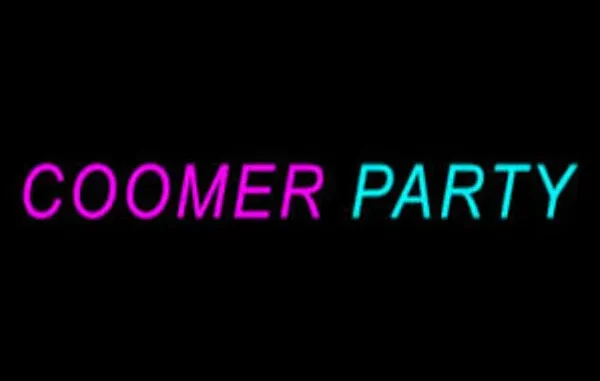
The internet has become a breeding ground for new forms of humor, subcultures, and memes that sometimes spread so quickly they become larger-than-life phenomena. One such example is the term “Coomer”, and its associated communities, such as CoomerParty. To many, these terms may sound strange or unfamiliar, but they’ve gradually found a place in the lexicon of meme culture, often representing a satirical or exaggerated version of a certain internet archetype. But what exactly is CoomerParty, and how does it tie into the broader internet culture?
In this article, we will explore what CoomerParty is, its origins, how it relates to internet culture, and the controversy surrounding it.
The Origins of Coomer and CoomerParty

What is a “Coomer”?
The term “Coomer” originates from internet slang, specifically memes and imageboards like 4chan and Reddit. It refers to an exaggerated depiction of an individual—typically a man—who is obsessively focused on consuming adult content, often to the point of addiction. The term “Coomer” comes from the onomatopoeic sound “coom,” which is a playful take on the act of ejaculation. In meme form, a Coomer is often portrayed as a man with an unhealthy obsession with pornography or other adult media, usually depicted in a humorous or exaggerated way to critique behaviors such as overconsumption of digital content or lack of personal discipline.
In early meme form, the Coomer meme features a “Coomer” character, typically drawn with exaggerated facial expressions—often with a disheveled look or tired eyes—symbolizing someone who is perpetually distracted by adult content.
While the meme itself is often meant to be a joke, it has evolved into something more. It has sparked discussions about internet addiction, the impact of digital media on mental health, and the blurred lines between humor and criticism in online spaces.
The Emergence of CoomerParty
As the term “Coomer” began circulating on various online platforms, a number of niche groups and forums emerged around the idea of CoomerParty. While the term originally described a person’s behavior or excessive consumption of adult content, the idea of a CoomerParty arose as a meme-driven subculture, typically within the more chaotic and absurd corners of the internet.
A CoomerParty is usually imagined as a gathering or group where individuals embrace or ironically celebrate the Coomer persona, often poking fun at themselves, their excessive behaviors, or even the societal expectations that lead to these behaviors. The CoomerParty is less of a literal party and more of an online conceptual space where humor, self-awareness, and the dark side of internet culture intersect.
Despite its meme-heavy nature, CoomerParty communities can also serve as a way for individuals to bond over shared experiences or frustrations related to the oversaturation of adult content online. Some interpret the idea of the CoomerParty as a way to mock or satirize the way internet culture, particularly digital pornography, has influenced societal norms.
The Role of CoomerParty in Internet Culture
Memes as Modern Social Commentary
One of the most powerful aspects of internet culture is the ability of memes to transcend mere entertainment and become a form of social commentary. In the case of CoomerParty, the meme taps into themes of addiction, overconsumption, and the diminishing of human connection through digital content.
The Coomer meme and its associated subcultures have played a part in broader discussions about online behaviors. For example, conversations about internet addiction, the effects of pornography on relationships and mental health, and the struggle for balance in a digitally mediated world have all been spurred by the rise of memes like Coomer.
The Hyper-Satire of Online Communities
CoomerParty also taps into the culture of hyper-satire, a defining feature of certain internet communities. In these communities, the boundaries between what’s serious and what’s absurd often blur, and the lines between self-deprecation and criticism of society’s excesses become almost indistinguishable. CoomerParty is a space where people engage in extreme forms of self-parody, calling attention to overconsumption of digital media, while also laughing at how ridiculous these behaviors can be.
At its best, CoomerParty can be seen as a form of dark humor, a way of using internet memes to reflect on the emptiness and loneliness that some people feel when consumed by digital content. At its worst, it may reinforce harmful stereotypes or glamorize unhealthy behaviors. This duality—funny yet thought-provoking—makes the Coomer meme both controversial and fascinating.
The Impact of CoomerParty on Popular Media
Coomer as a Cultural Archetype
As Coomer memes gained traction, the Coomer character became more than just a niche meme. It transformed into an archetype that appeared in broader pop culture and even mainstream media. Whether it was used to critique internet addiction in documentaries or referenced in comedic television series, the Coomer figure became synonymous with a certain type of obsessive, isolated, and online-driven persona.
The meme’s prevalence has sparked conversations about digital life’s impact on individuals, especially on the younger generation, who have grown up with constant access to the internet. Coomer memes, including CoomerParty, serve as an ironic commentary on the addictive nature of certain online behaviors, while also highlighting how internet culture continues to shape modern identity.
Influence on Online Platforms
Certain online platforms, especially forums like 4chan, Reddit, and other meme-heavy websites, continue to foster Coomer Party-like communities, where users interact through memes, share exaggerated portrayals of the “Coomer” lifestyle, and occasionally discuss topics related to digital media addiction. These communities sometimes take a critical view of their own behaviors and may even work as a space for catharsis.
However, the influence of CoomerParty also extends to the realms of online streaming and gaming. Streaming platforms like Twitch or YouTube may see subcultures evolve around the idea of “Coomer” characters, with content creators exaggerating their Coomer personas for comedic effect. The meme’s ubiquity means that references to the Coomer archetype often show up in joke formats, commentary, and video content.
The Controversy Surrounding CoomerParty
Meme Culture vs. Harmful Behavior
While some may see CoomerParty as an innocent form of satire, others criticize it for encouraging unhealthy behaviors or trivializing serious issues like pornography addiction. There’s a growing concern about how online communities, particularly those centered around adult content, can sometimes reinforce damaging stereotypes or perpetuate toxic behaviors.
For instance, the Coomer persona often mocks men who become consumed by digital content, but it may inadvertently perpetuate ideas of shame around intimacy, sexuality, and relationships. Some argue that the constant jokes about Coomers in the meme space may make it harder to have open, honest conversations about addiction, consent, and the impact of digital pornography on mental health.
The Line Between Humor and Harm
Like many internet subcultures, CoomerParty sits at the intersection of humor and harm. It’s a space where exaggerated self-criticism and absurdity can both entertain and alienate. On one hand, people in these communities might be poking fun at internet culture itself, but on the other hand, the memes may feed into stigmatization of certain behaviors and relationships.
As with all internet-based phenomena, the lines between parody, social commentary, and reinforcement of harmful tropes can be difficult to navigate. The challenge for creators and members of these communities is finding a way to laugh at the absurdity of online behaviors without minimizing the real-world consequences of addiction and unhealthy consumption.
Conclusion: The Future of CoomerParty and Meme Culture
The term CoomerParty, much like the larger Coomer meme, continues to evolve and adapt as internet culture shifts. Whether it becomes a more satirical commentary on society’s overconsumption of adult content or evolves into something else entirely, it will likely remain a key example of how modern meme culture addresses deeper psychological and social issues.
At the heart of CoomerParty is a reflection of internet subcultures, where humor and critique are inseparable, and where digital lives and real-world consequences collide. Like all memes, its relevance may fade over time, but the cultural impact of the Coomer meme and its associated communities is undeniable. It serves as a reminder of the strange, often absurd ways in which modern technology shapes our lives.
About the Author
Ana Milojevik is a digital culture analyst and writer with a deep understanding of internet subcultures, meme evolution, and online communities. With years of experience exploring how humor, satire, and digital behavior intersect, Ana specializes in decoding the meaning and impact of viral trends like CoomerParty.
Through her work at Mega-Personal.net, she examines the deeper psychological and societal implications of internet phenomena—making complex subcultures accessible and thought-provoking for all readers.
Leave a Reply